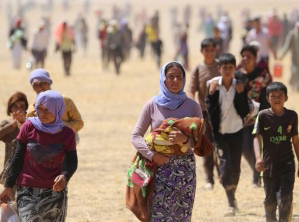
Syrian Christians shared their stories on what life was like under the terror group known as ISIS. Some of them even threw their support behind Syria's president Bashar al-Assad.
In an article written by Patrick J. McDonnell of the Los Angeles Times, it has been five years since the Syrian civil war broke out in the country. Assyrian Christian Asmar Jumaa, 22, recalled what happened to Christians, Yazidis and other minorities under ISIS-controlled territory in Syria; her family managed to escape to neighboring Iraq.
"I remembered what they did to the Yazidi women," Jumaa said in reference to the mass kidnappings carried out by ISIS last year. "I didn't want that to happen to us."
McDonnell elaborated on the plight of Christians and other minorities in Syria. He cited figures from the United Nations that indicated more than 3 million Syrians were refugees in other countries, while 7 million were internally displaced.
"The Christians who fled the isolated Khabur riverside settlements of eastern Syria last month appear to be generally better off than most," McDonnell wrote. "Typically, they have found shelter in tightknit Assyrian communities in northern Iraq, Lebanon and in Kurdish-controlled areas of northeastern Syria's Hasakah province. Living with kin is preferable to the gloomy, overcrowded refugee camps that now dot the region."
However, McDonnell reported that ISIS militants overran the "Christian self-defense home guards," seizing several villages along the Khabur River. Kurdish forces were able to evacuate the town of Tel Bas, the home village of Jumaa's family, and other nearby areas.
"Look, we've had enough of Daesh and the others," Kenyas Jumaa, father of Asmar, said, referring to ISIS by its Arabic acronym. "How can we be sure we can ever be safe from them? Even here in Iraq."
According to McDonnell, the Jumaa family has been relatively fortunate compared to other refugees in the area. Some of them made their way into Iraq, while others went to places such as Sweden, Lebanon, Holland, Canada, New Zealand and the state of Arizona.
"I'm fine as long as I'm together with my wife and family," Kenyas Jumaa said with a smile.
Given that the alternative is living under ISIS, Edward Dark (a pen name) of Al-Monitor reported that many would rather live under the Assad regime, particularly those in the city of Aleppo. He spoke with Abu Fadi, who lived in a predominantly Christian neighborhood in that city, about the current conflict.
"Before the war, we [the Christians of Aleppo] were secure as a community, but now we live in fear for our continued existence in Syria," Fadi said. "It has never been this way, not in anyone's living memory. We are feeling persecuted in our own country."
Fadi told dark that many of the young people have left Aleppo to pursue a better life. Many of them wanted to emigrate from Syria to Europe.
"Look at the situation here. The conditions are awful," Fadi said. "It is dangerous. There are bombs and bullets falling everywhere, and there is no work and no money and everything is so expensive. Is this a proper and dignified life?"
Fadi had no problem expressing his support for the Assad regime.
"There is no question at all about whom we support: the government, of course," Fadi said. "It is the only force protecting us from the jihadists and extremists."
Dark asked Fadi on what kind of terror groups were currently carrying out attacks against Christians in Aleppo.
"What difference does it make?" Fadi said. "Look, we are targeted now as a religious community; this is very clear to us. They want to get rid of us, drive us from our lands that we have inhabited for centuries. They have destroyed churches."
Dark then asked why the Christians in Syria haven't taken up arms like the Assyrians did in Hasakah. Fadi replied that those were two separate cases.
"There they are fighting IS, so there is acceptance for them to form their own militias," Fadi said. "They will even get international support for doing this. Here, it is different in Aleppo. If we want to fight we must join government formations and we are called shabiha thugs. It's all about global politics."
The Jumaa family happened to agree on that sentiment. According to McDonnell, their area used to be a "sleepy, idyllic refuge" before the "toxic brew of religion and politics" in the Middle East shattered the peace.
"Politics is a dirty thing," Asmar said. "You can't understand it, no matter how hard you try."
According to McDonnell, many of the Assyrians in the Khabur River region are the descendants of Christians who fled in the 1930s to Syria, which was then under French mandate rule. Back then, many of them escaped the massacre carried out by Arab and Kurdish Muslims in northern Iraq.






